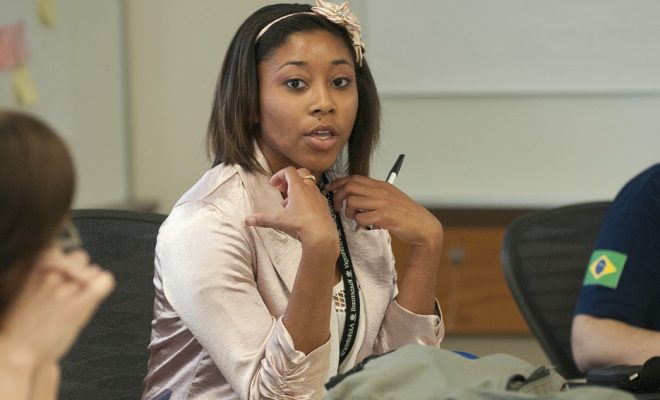2 Concepts that Illustrate How Fun Math Actually Is

President Obama’s Race to the Top initiative emphasizes STEM learning, particularly in mathematics, in order for more students to make it to high school graduation and the college degree beyond it. At its core, mathematicians’ median annual pay in 2013 was just over $101,000 – and is expected to grow by 23 percent by 2022. Take into account all of the computer science, technology and engineering jobs that are also rising rapidly, and it’s easy to see why students today NEED math proficiency and why it is up to P-12 educators to instill both aptitude and an interest in the traditionally less-exciting subject.
In other words, math is useful.
However, math is more than just useful. It can also be fun and engaging. Math can be an experience.
Let’s look at two concepts that show that math is really more than an obscenely difficult, abstract subject we need to learn at school to become more globally competitive.
- Math as a universal language. Fifth-grade students at Woodward Elementary School had an interesting math assignment last fall: watching college football games. Though seemingly fun on the surface, the assignment had an ulterior motive. Students were asked not simply to watch the college football games, but to score the plays and keep track of yards, points and time. The raw data they collected was then translated into fractions and percentages and used as mathematics learning tools. What is most remarkable about this assignment, first reported by Fox News, is that the point of the exercise was not simply to make math “fun” or practical. Teacher Scarlett Childers was also looking for a way to reach across the socio-economic and language barriers of her students.
At Woodward, 98 percent of the student body is on the subsidized lunch program and 95 percent learned English as a second language. Math, it seems, became a universal language in her classroom, better understood through a real-world assignment. The statistics at Woodward represent a larger cultural trend, too. Over 60 million people, or one-fifth of people, in the U.S. do not speak English at home which presents a problem in English-speaking K-12 classrooms. Dual-language programs have long been the trendy tactic for bringing down language-learning barriers.
Math is something we struggle with in our public schools regardless of socioeconomic status. In Rhode Island, for example, poor math performance in high school is linked to lower enrollment in college and failure to complete college. Fewer than 42 percent of 11th grade Rhode Island students who were considered “below proficient” on NECAP math ended up enrolling in college. Rhode Island is not exactly known as a diverse area, so that statistic presumably means that most of those students are native English speakers and from mid- to high-income households.
Imagine then the ramifications of that statistic on more diverse, urban K-12 classrooms? The good news is that urban school districts, though still often underperforming in math, are showing the greatest positive improvement in math achievement. Large cities are making progress more quickly than the nation as a whole. Fourth and eighth graders in U.S. cities with at least 250,000 people have improved more quickly in math learning than the national average, according to a report by National Assessment of Educational Progress. The students who speak English as a second language in these urban settings are improving at a faster rate in math than their native English-speaking peers around the country – and that speaks volumes to the power of math as a universal subject and equalizer.
There are certainly programs that target urban students when it comes to math, and other STEM, learning but I’d like to think that much of that progress is a direct result of the teachers in the classroom, like Scarlett Childers. There is no way that one math-learning or ESL initiative drawn up by a district or the state can adequately address the students that need the extra boost. Individualized plans, like the college football scoring assignment, are what really get through to students and bring them to a place of better long-term comprehension. Instead of being a learning complexity, I believe innovative math learning initiatives are the key to overall K-12 academic improvement. Math is a universal language and one that needs practical applications to really have an impact. That starts with the teachers but needs support from the decision-makers to truly make a difference.
- Math as a role-playing game. I had the chance to learn about Mathbreakers, a virtual math playground that starts with topics as basic as counting and advances through complicated subjects like Calculus. Instead of handing students worksheet-style problems through digital means, Mathbreakers uses action adventure role-playing to give students a fun, yet calculated, gaming environment that puts math at the center. As classrooms become even more gamified, Mathbreakers is a leader in making those concepts effective ones with real-world applications.
The game uses number sense, or the ability to see how to work with numbers and multiple solution approaches, instead of using rote memorization concepts like times tables. Players are in control of their futures in a third-person shooter style that takes them through an array of conquests and challenges.
Mathbreakers is a step towards a full math curriculum available in a virtual world, where students can learn about multiple types of math in the same environment. The vision of the application’s creators is that math learners at many levels can use the game to help visualize and understand mathematics on a fundamental level. That starts with basics like number sense, fractions, the number line, operators, and negative numbers.
Instead of giving players one set answers, Mathbreakers lets them use creativity to use math and create their own worlds, in essence. I was really impressed with the way the application seamlessly integrated concepts like multiplication and functions with the storyline and fun of the game itself. Not only does the game encourage players to use math (not just recite it) but it really is a lot of fun.
It seems that the Mathbreakers concept is really starting to catch fire. Schools are now interested in buying Mathbreakers applications to supplement, or even replace, their existing math practices. It makes sense since Mathbreakers adheres to Common Core Standards for grades 1 to 5.
As more people learn about Mathbreakers, I believe that more students will be given the opportunity to have an “Aha!” moment with math. We cannot force students to be interested in any topic but with the right presentation, educators can give students a better chance at succeeding in even the most difficult topics. The game has the ability to transform the way basic math is taught, and to transform student attitudes in the process.
Mathbreakers is a start-up from Mountain View, California. Check out their website at https://mathbreakers.com/
What are other ways to make math more appealing to students?





